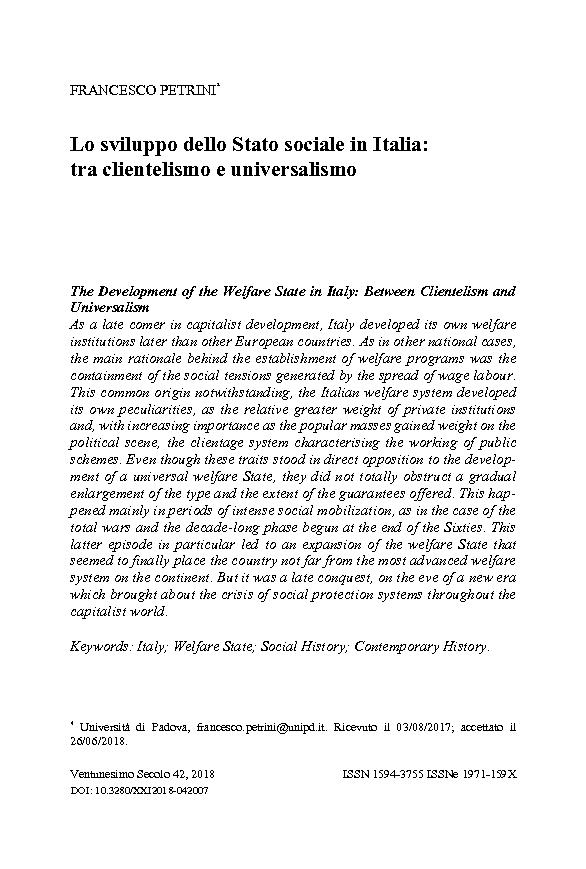2018 - Franco Angeli
Article
Digital Version
Télécharger | Copier/coller | Impression
Lo sviluppo dello Stato sociale in Italia : tra clientelismo e universalismo
113-130 p.
- As a late comer in capitalist development, Italy developed its own welfare institutions later than other European countries. As in other national cases, the main rationale behind the establishment of welfare programs was the containment of the social tensions generated by the spread of wage labour. This common origin notwithstanding, the Italian welfare system developed its own peculiarities, as the relative greater weight of private institutions and, with increasing importance as the popular masses gained weight on the political scene, the clientage system characterising the working of public schemes. Even though these traits stood in direct opposition to the development of a universal welfare State, they did not totally obstruct a gradual enlargement of the type and the extent of the guarantees offered. This happened mainly in periods of intense social mobilization, as in the case of the total wars and the decade-long phase begun at the end of the Sixties.
- This latter episode in particular led to an expansion of the welfare State that seemed to finally place the country not far from the most advanced welfare system on the continent. But it was a late conquest, on the eve of a new era which brought about the crisis of social protection systems throughout the capitalist world. [Publishers' text].
-
Informations
Code DOI : 10.3280/XXI2018-042007
ISSN: 1594-3755
KEYWORDS
- Italy, Welfare State, Social History, Contemporary History
-
Dans le même fichier
- Introduzione
- La Francia politica nel post 1945 tra storia di successo e preoccupante declino?
- Due transizioni a confronto : il passaggio dalla Quarta alla Quinta Repubblica francese e il mito della Seconda Repubblica italiana
- Par-delà les systèmes internationaux et européens, la France : une puissance à vocation universelle1?
- Dal primato della nazione alla sfida dell'ordine post bipolare : evoluzione e prospettive della politica estera italiana
- Les errances de la Providence : interventions et évolutions de l'État en France
- Lo sviluppo dello Stato sociale in Italia : tra clientelismo e universalismo
- La communication politique en France de 1945 à nos jours
- Piccolo schermo e politica nell'Italia repubblicana : dal rifiuto della personalizzazione alla video-politica (1946-2017)
- L'économie française de 1945 à nos jours : la grande transformation
- La convergenza interrotta : il percorso dell'economia italiana allo specchio della Francia (1948-2008)
- Dagli italiani di Aigues-Mortes agli africani di Ventimiglia : storia delle relazioni migratorie italo-francesi (1946-2016)
- Tavola rotonda : un dialogo tra passato, presente e futuro
- Notizie sugli autori



